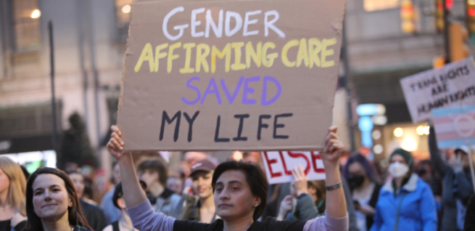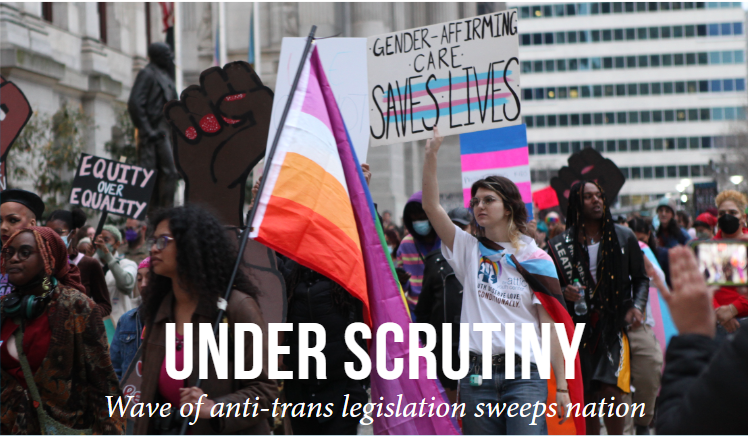Under Scrutiny: Wave of anti-trans legislation sweeps nation
April 25, 2023
By Evan Lu and Hiba Samdani, Co-Editor-in-Chiefs
Editor’s note: The Spoke talked to a Conestoga alumna who, since graduating, has transitioned to a woman. She agreed to speak on the record under the condition that The Spoke kept her identity a secret. This article refers to her by the fictional name Megan Smith.
“When trans lives are under attack, what do we do? Stand up, fight back.”
Hundreds of protestors chanted outside the steps of Philadelphia City Hall as evening rush hour commenced on March 31. The Philadelphia rally of the March for Queer and Trans Youth Autonomy was matched by those in cities across Pennsylvania such as Pittsburgh, Oil City, and Harrisburg; similar marches took place in all 50 states and Washington D.C.
Organized by Queer Youth Assemble, a youth-led non-profit working to bring autonomy to queer youth ,the protests come amidst a nationwide wave of pending legislation regarding LGBTQ and transgender policy issues. Spanning federal and state legislatures, bills and policies proposed include those regarding transgender athletic competition and censorship of LGBTQ topics in schools. Such marches are important public forums through which constituents can broadcast their opinions. Protester Lydia Jones feels that the Philadelphia community is particularly receptive to advocacy for transgender autonomy.
“I think we’re really lucky that Philly tends to have widespread support for LGBTQ rights. There are definitely places where marches like this would not have so much support and welcoming,” Jones said. “Sometimes we feel like just marching or talking to our family can’t help, but there are some really crazy bills out there, and we need to do anything we can to prevent them from passing or staying in effect.”
Protestor Alex H., who requested to go by the first initial of his last name only, originally intended to attend a different march that was canceled due to worries about counter protests causing violence.
“I thought to myself, ‘This is exactly what the anti-trans people want.’ They wanted that, they’re winning. So okay, if that one’s not going to happen, I’m just going to go to a different one,” Alex said. “So here I am.”
While Alex maintains faith in Pennsylvania’s legislature, he worries about trans rights in other states.
“I think our governor would veto all the (anti-trans) legislation, but it’s more concerning in the South. It’s government overreach and honestly a violation of human rights,” Alex said.
In the coming months, bills will be considered within the Pennsylvania state legislature. Senior Evelyn Yu echoes the sentiment expressed by Jones and Alex.
“I think (anti-trans legislation) is a distressing trend that’s sweeping the United States,” Yu said. “I hope that it doesn’t come to fruition in our state because that’s a move backwards for the rights of historically overlooked groups.”
Legislators address transgender athletes in schools
Nationwide, conservative politicians have targeted transgender youth by introducing legislation that bars their participation in school sports that align with their gender identity. According to the National Conference of State Legislators, currently 18 states have bans in effect, primarily in K-12 schools, but sometimes extending to the collegiate level.
On April 6, the Biden administration introduced a Title IX change proposal that would prevent states and schools from enacting blanket-level bans on transgender athletes. Teams could still create limits on a case-by-case basis “when they enable the school to achieve an important educational objective,” according to the U.S. Department of Education. However, completely barring participation would violate Title IX, which prohibits sex-based discrimination in federally funded education programs.
These laws have honed in on transgender women and girls competing in women’s athletics, as some argue transgender women and girls have an unfair biological advantage over their cisgender counterparts. A 2021 study published in the British Journal of Sports Medicine found that, at the Olympic level, transgender women performed 10% more pushups and 6% more situps than cisgender women after one year of hormone therapy. After two years of hormone therapy, trangender women performed at the same physical level as cisgender women.
’Stoga alumna Megan Smith, a transgender woman who plays club sports at the collegiate level, feels that the length of treatment should determine one’s eligibility in the sport.
“I think it’s ridiculous to go ‘I’m trans’ one day and ‘I should immediately switch (categories in athletic competition)’ because that’s people taking advantage of the system,” Smith said.
However, after receiving treatment through transgender hormone therapy, Smith feels the differences between transgender and cisgender females are minimized.
“After a certain duration, I do not have any biological advantages people talk about. However, it doesn’t matter, because any achievement or accolade I get in a sport is diminished and just ridiculed. Because, ‘Oh, she’s trans, so she just doesn’t deserve any credits,’” Smith said.
Smith takes medication that blocks testosterone and increases levels of estrogen and progesterone. Current guidelines established by governing bodies like the International Olympic Committee state that transgender women athletes must maintain testosterone levels below 10 nanomoles/liter, although the average for cisgender women falls between 0.3-2.4 nanomoles/liter.
From personal experience, as long as Smith’s physique aligned with her gender identity, no one questioned her participation at the collegiate club level.
“Because I ‘pass’ — I look female, I sound femme, etcetera, etcetera — no one knows (I am trans). If I still have very masculine traits, that’s when you get the discrimination,” Smith said. “It’s sort of like erasure in that I’m ‘allowed’ to be trans because I look female.”
While controversy largely surrounds transgender women in sports, transgender men may face similar challenges. Senior Macyn Bass socially transitioned as a transgender man in July 2022, but has not medically transitioned. Bass plays for the girls rugby team as a personal choice.
“I feel more comfortable with the girls — I kind of always have — but I think it really depends on the athlete,” Bass said. “As much as there is transphobia, there’s also a misogynistic take because it’s rooted in the idea that women can’t compete. It’s completely unfair. I have met some of the strongest women in sports, and they could compete with any man that you put them up against.”
Currently in Pennsylvania, anti-trans sports bills were introduced into the state legislature, but none have been passed.

Notably, the Protect Women’s Sports Act (House Bill 972) first proposed in 2021, would prohibit transgender girls from competing in women’s sports. Critics of the legislation feel that these bills discriminate against trans athletes, as a large component of sports is belonging and well-being. Banning the participation of trans athletes subjects them to humiliation and ostracisation from their peers, which worsen mental health.
“We need to just protect our community. Students need to start seeing everybody in the community as their obligation, to choose to just be kind, accepting and affirming because the mental health of their peers is much lower than the mental health of our heterosexual cis(gender) normative population,” said Asher Rhodes, a physical education teacher at Conestoga and one of three advisers of the Gender/Sexuality Alliance. “School becomes their safe space, and our students need to open up to that and make that an even safer space for them.”

Censorship of LGBTQ discussion in schools
In October 2022, the Pennsylvania Senate introduced the Parental Bill of Rights Act (House Bill 319), which would limit conversations on sexual orientation and gender identity in certain grades. If passed, the bill would give parents more control over content taught in public schools.
“It’s really upsetting because it’s not doing anything,” said senior Cathryn Cheetham, vice-president of Conestoga’s GSA. “People aren’t being indoctrinated by the schools acknowledging that LGBTQ people exist.”
This bill is one of three major anti-trans bills that have been introduced into the Pennsylvania legislature this year. For example, House Bill 138 extends the statute of limitations for lawsuits from those who received gender affirming treatment as minors. To raise awareness for the surge of anti-LGBTQ legislation, members of the GSA have made infographics and handouts to be passed out to teachers. However, while Cheetham finds the T/E School District to be generally supportive of the LGBTQ community, she does not feel they are always vocal about their support.
“Anytime it was proposed that the school say something about Pride Month, or display a queer flag somewhere in school, it’s been pushed off,” Cheetham said. “I kind of understand that, because there would be people that would be really upset about that.”
If such legislation passes, it will mirror laws already passed in primarily southern states like Florida, Alabama and Tennessee. These bills are sparked by fears that learning about sexual orientation and gender affirming health care could make youth more likely to identify with the LGBTQ community. Biology teacher and GSA adviser Valerie Cunningham emphasizes the importance of protecting LGBTQ topics in curriculums.
“The GSA has been fighting for a long time to be included in a part of the curriculum, to have representation through LGBTQ authors. It means a lot to the students, and I’m fearful that any progress we have made might go backwards,” Cunningham said.
Though social studies and English courses are most likely to be affected by potential changes, other subjects may be forced to adapt too. Cunningham uses the example of 1970s environmentalist Rachel Carson.
“She was the one that inspired DDT to be banned as a pesticide, and she was gay. That’s important to talk about when we’re learning about her because it was used against her when she was trying to present her scientific concepts,” Cunningham said. “If I can’t talk about that, it takes away a critical piece of her story.”
For Cheetham, such fears are all the more reason to get involved.
“The narrative that (legislators) are doing this to protect the children is not doing anything,” Cheetham said. “There’s so many things that could be done that would save a lot more lives than taking away the access that youth have to be able to feel like themselves.”
Evan Lu can be reached at [email protected].
Hiba Samdani can be reached at [email protected].
